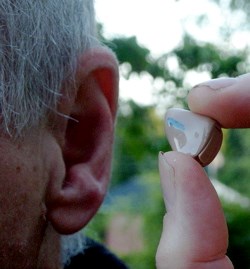NEWS RELEASE
TONY MARTIN, MP
************************* NDP bill advocates tax fairness for hard of hearing
OTTAWA - Today Peter Julian, (Burnaby-New Westminster), tabled Bill C-577 An Act to amend the Income Tax Act (hearing impairment) which would increase inclusiveness for people with hearing disabilities by allowing fair access to the Disability Tax Credit.
“The places we live, play and negotiate are noisy, often with distracting background sounds, so I am happy this legislation will recognize that reality for the hearing impaired and make the disability tax credit more accessible to them,” said Tony Martin (Sault Ste. Marie) NDP Critic for Persons with Disabilities who seconded the bill.
The current regulations are ambiguous and do not reflect real life situations so Bill C-577 would fix this by:
- Redefining “quiet setting” to be “normal setting” for sound levels in tests
- Changing the requirements so that a person is eligible if they are unable to understand “another person,” rather than “a person familiar to them”
- And not requiring that the person to be wearing an “assisted listening device” when the degree of impairment is being assessed.
The bill has received much praise and broad-based support from the Hard of Hearing community who have long been advocating changes in the eligibility criteria for the tax credit.
“The current Disability Tax Credit (DTC) is so ambiguous that there are no consistencies as medical physicians and audiologists have a hard time in certifying it for their hard of hearing patients”, said Michael Currie, chair of the Canadian Hard of Hearing Association National Working Group. "It is our hope to bring clarity and fairness to the DTC."
“The existing criteria for eligibility for the tax credit discriminate against individuals with hearing loss who use cochlear implant or digital hearing aid technology and who have learned to speak,” said Norah-Lynn McIntyre, executive director of VOICE for Hearing Impaired Children.
“The current criteria and terminology are causing a great deal of uncertainty for our member audiologists,” says Gillian Barnes, Canadian Association of Speech-Language Pathologists and Audiologists president. “Mr. Julian’s proposed changes to the Income Tax Act will have a positive impact.
“The Canadian Academy of Audiology is in full support Mr. Julian's effort to reduce ambiguity and confusion with regards to the terminology used to qualify those with hearing loss for the Disability Tax Credit,” says Rex Banks, in-coming president of Canadian Academy of Audiology.
“The purpose of the income tax act is distorted. The federal government should show that they value people’s well-being over shallow fiscal concerns and ensure that all Canadians with hearing loss get the tax break they deserve,” said Julian.
*************************
